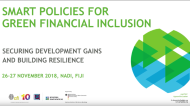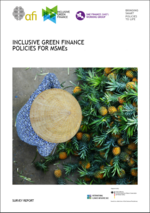Inclusive Green Finance Project (Phase III)
The members of the Alliance for Financial Inclusion (AFI) view financial inclusion as a key factor for the achievement of SDGs. The AFI provides central banks, financial supervisory authorities, finance ministries and other relevant actors in over 80 developing markets and emerging economies with a global platform for financial inclusion. Together, these parties are working to develop innovative and effective political strategies for combating climate change and adapting to its impacts. The project is also offering peer learning, resource- and expertise-building, public-private dialogue, institutional analysis and other services for AFI members, with the aim of ensuring that they are then in a position to implement relevant national policy goals. More than 200 decision makers will benefit from these professional training programmes. Insights will be shared in the AFI network and therefore also with financial regulatory bodies.
- IKI funding
- 6,636,068.00 €
- Duration
- 06/2018 till 09/2027
- Status
- open
- Implementing organisation
- Alliance for Financial Inclusion (AFI)
- Political Partner
-
- Diverse climate change relevant institutions in the respective partner countries/Diverse klimarelevante Institutionen in den entsprechenden Partnerländern
- United Nations Environment Programme (UN Environment)
State of implementation/results
- Policy Development
- At the 11th IGFWG Meeting members gained insights from El Salvador’s green taxonomy and green finance roadmap, emphasizing regional collaboration on IGF.
- Five new workstreams launched:
- 1. Greening the MSME sector
- 2. Inclusive, Affordable, and Sustainable Housing
- 3. IGF as a pathway to proportionate sustainable finance standards
- 4. Green Finance Taxonomies
- 5. A study on climate risks affecting MSMEs access to finance (in collaboration with SOAS University).
- Members approved two initiatives:
- 1. The IGF Progress Measurement Framework to track progress.
- 2. The IGFWG Expert Advisory Team to provide policy guidance.
- Public-Private (PPD) Collaboration
- A Leaders’ PPD was held with 41 participants from 14 AFI institutions and 10 partners who shared insights on how credit, insurance, and payment systems build resilience and support climate change mitigation and adaptation for low-income populations. Next steps include exploring digital infrastructure and digital payments in the context of IGF, with strong interest from the private sector to engage with AFI on these topics.
- Regional Initiatives
- IGF policies are now being prioritized across all regions. AFI Pacific leaders endorsed the Natadola Roadmap, setting targets for regional IGF projects, enhancing member capacity and strengthening partnerships. Collaboration with the Global Green Growth Institute (GGGI) was initiated. In Q1 in Armenia, AFI’s Eastern Europe and Central Asia (EECA) members including Armenia, Kazakhstan, Mongolia, North Macedonia, and Uzbekistan prioritized IGF for the first time and shared progress in building resilience for vulnerable populations.
- Four Completed In Country Implementation Projects
- Nepal Rastra Bank (NRB): The Nepal Green Taxonomy was released for public consultation. Aligned with international taxonomies it defines green investments, particularly for MSMEs and is expected to increase finance flows towards a green, resilient, economy.
- Maldives Monetary Authority: The finalized Green Finance Taxonomy provides a Maldives specific definition of green investments. As a small tourism reliant economy this taxonomy will direct finance towards conserving natural resources.
- Palestine Monetary Authority (PMA): A Sustainable Finance Roadmap was developed after a diagnostic study and consultations. It sets priorities for finance flows towards green activities particularly for MSMEs, supporting adaptation and transition to a greener economy.
- SEPS Ecuador: The completed ESRM toolkit was launched, offering practical guidance for the cooperative and housing sectors in managing climate-related risks. This is Ecuador’s first financial sector regulation and can serve as a model for others.
- These initiatives show AFI’s growing momentum in expanding IGF services, increasing reach, enhancing advocacy and strengthening partnerships. AFI has deepened its impact with detailed implementation plans that foster regional and national progress. AFI‘s IGF offerings are well-equipped to respond to the climate crises through an inclusive approach.
Latest Update:
04/2025
Further links
- Publication: The Special Report on Measuring Inclusive Green Finance Data
- Video: This is Inclusive Green Finance animation
- Report: The Roadmap to Inclusive Green Finance Implementation
- Report: How financial regulators include climate risks into risk management process?
- Report: Developing economy financial regulators use Inclusive Green Finance to build resilience and mitigate against impact of climate change
- Report: AFI’s IGF and SMEF Working Groups join forces for a greener future at the foot of Mount Everest
- Article: Why El Salvador is banking on Environmental and Social Risk Management
- Article: Embedding sustainability across the banking sector: Egypt’s Inclusive Green Finance journey
- Article: In Bangladesh, financial inclusion is driving climate resilience
- Article: How financial inclusion can help combat climate displacement
- Article: There can be no financial inclusion without sustainability
- Article: Mitigating the impact of climate change: Papua New Guinea’s Inclusive Green Finance journey
- Article: Supporting climate resilience and economic growth: Armenia’s Sustainable Finance Roadmap
- Article: Inclusive green finance builds climate resilience, AFI’s experience shows
- Article: Building financial resilience to climate impacts in Vanuatu
- Article: How to implement Inclusive Green Finance policy? AFI members exchange insight in Kuala Lumpur
- Article: Solving the climate crisis: pushing for Inclusive Green Finance at COP28
- Article: Inclusive Green Finance: AFI training explores how to turn theory into practice
- Article: Mongolia helps bring Nepal’s Inclusive Green Finance ambitions to life
- Youtube: AFI Joint Learning Program on Inclusive Green Finance Policy Implementation - Event Highlights
- Youtube: Why is Inclusive Green Finance (IGF) crucial for addressing climate change?
- Article: Natadola Roadmap to Inclusive Green Finance in the Pacific
- News: AFI/G-24 meeting spotlights need for inclusive approach to implementing global sustainable finance standards
- News: Communique issued during 2024 PIRI Meetings in Fiji
- News: AFI’s Pacific Island members launch roadmap for Inclusive Green Finance
- News: Why action on climate finance must center on inclusion
- News: Inclusive Green Finance is taking root in AFI’s Eastern Europe and Central Asia region
- News: Collaboration is key to advancing Inclusive Green Finance, say AFI leaders and private partners
- News: Inclusive green finance builds climate resilience, AFI’s experience shows
- Case study: Roadmap for IGF Implementation Part 2: Country Case Studies on IGF Policy Implementation
- Blog: Tackling climate change and financial inclusion will require cross-cutting solutions
- Blog: Inclusive green finance is equipping Ecuador’s communities to cope with climate change
- News: How Ecuador’s Environmental and Social Risk Management guidelines are changing lives
- News: AFI members gear up to help small businesses go green
- News: Helping MSMEs Go Green: Central Bank of Egypt Shares its Experience with Zambia and Eswatini
- News: Nepal Rastra Bank issues a comprehensive Green Finance Taxonomy
- News: Speaking up for Inclusive Green Finance at COP29
- Video: AFI promotes Inclusive Green Finance at COP29
- News: Potential of Inclusive Green Finance highlighted in G20 report
- Video: Inclusive Green Finance policies offer a lifeline for small businesses
- Video: How can central banks respond effectively to climate change?
- Video: Ecuador's ESRM guidelines in action
- Youtube Playlist "AFI Green Financial Inclusion Conference in Fiji"
Project relations
Legend:
The link has been copied to the clipboard
Related Publications
-
![[Translate to English:]](data:image/gif;base64,R0lGODlhAQABAAAAACH5BAEKAAEALAAAAAABAAEAAAICTAEAOw==)
-
 09/ 2021 | Guideline
09/ 2021 | GuidelineDemand-side Approach to Inclusive Green Finance Data Collection
English (external link)
-

-










![[Translate to English:]](/legacy/Bilder/2021/20210923_AFi_Disaster_resilience_Thumb.jpg)






![[Translate to English:]](/legacy/_processed_/1/e/csm_20201008_Inclusive_Green_Finance_Thumbnail_583f231117.png)
